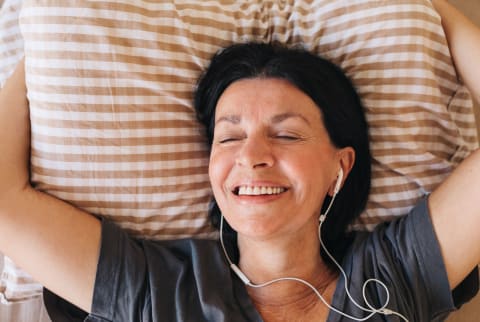Advertisement
Sleep Quality Tends To Decline With Age — But Is There Anything We Can Do About It?


For some older adults, getting a good night's sleep can be a real nightmare. Research shows1 that people over the age of 65 tend to have more trouble falling asleep and staying asleep than younger adults do, and as a result, they spend more time awake in bed and less time in deep sleep stages.
We consulted sleep specialists to learn why sleep quality tends to diminish with age and what (if anything) can be done about it.
Why older adults tend to have trouble with sleep.
Kelly Glazer Baron, Ph.D., MPH, DBSM, a clinical psychiatrist and the director of the behavioral sleep medicine program at the University of Utah, explains that our sleep needs actually stay pretty consistent throughout adulthood. "The data shows that the amount of sleep that [older adults] need doesn't change," Baron tells mbg. "The change is in our ability to get that sleep."
In other words, "Up to 50% of older adults report insomnia symptoms; however, this does not mean that insomnia is a normal part of aging," reads a review article in Sleep Medicine Clinics.
So if the amount of sleep we need stays consistent as we age, why do so many older people struggle to get it? There seems to be a mix of reasons. "Quality of sleep can decline due to hormonal changes, medical complications, and stress," neurologist Nicole Avena, Ph.D., explains.
On average (though this certainly isn't true for everyone), older people tend to be less physically active, on more medications, and more prone to chronic pain and overactive bladders—all factors that can diminish sleep quality.
And while those who opt to retire do tend to have looser schedules and more time on their hands to rest, this can actually diminish sleep quality in some cases. "If you spend too much time trying to sleep, your sleep gets really broken up and inefficient, and you spend a lot of time awake in bed," Baron explains.
For this reason, finding a consistent sleep-wake schedule that works for you and sticking with it is actually one of the main things older adults can do to protect sleep quality.
"Mental and physical stimulation during the day is also really important," Baron adds. She explains that one of the most consistent findings in sleep research is that exercise is great for sleep quality2. And it doesn't have to be too rigorous: Moderate exercises like brisk walking, bodyweight exercises, and yoga are all helpful when done regularly.
Keeping the mind active through activities like reading, cognitive games, and social engagement is also important, as is prioritizing mental health.
You'll notice that all of these strategies, in addition to helping with sleep, can also support longevity and good health more generally.
Gearing up for a lifetime of solid sleep.
Younger readers might be wondering, is there anything I can do now to set myself up for good sleep once I get older? Yes and no. While there's no way to predict what sleep complications will arise later in life, maintaining a healthy lifestyle when you're young can only help you down the line.
"Physically healthy people sleep better. That's what it comes down to," says Baron. "Physical fitness and good cardiovascular health are protective for Alzheimer's and also for sleep. All those things are intertwined."
Adopting good sleep habits early can also set a solid foundation. Every adult, no matter their age, would be well served to find a healthy nighttime routine that works for them. Some elements of yours could include stopping drinking alcohol and caffeine early in the day; avoiding sugary snacks or large meals before bed and grabbing something higher in sleep-supporting nutrients like magnesium instead; shutting down electronics at least an hour before sleep; and maintaining a dark, cool bedtime environment.*
Moral of the bedtime story: The obstacles to sleep tend to change as we get older, but our ways of dealing with them don't necessarily have to.
